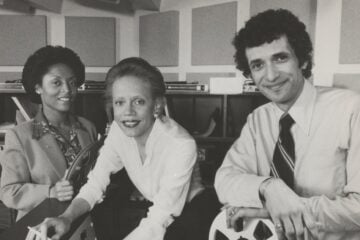Wednesday roundup: WVIA buys out former president’s contract; KETC features St. Louis Symphony
• WVIA in Pittston, Pa., has turned to donations from “private individuals” to buy out the contract of president emeritus Bill Kelly, whose high salary proved to be a point of contention for unhappy station donors. After the station moved Kelly into his emeritus role in 2013 — in which he earned $199,000 annually — it lost more than 6,000 members, according to the local TimesLeader.com. Donations amounting to more than $290,000 were collected to buy out Kelly’s contract, and he left the station Dec. 31. “The WVIA board wants its members to know their concerns were heard and the board has taken corrective action to address this important issue,” wrote board chair Martin Walzer in a message on the station’s website.
• Even as one partnership between a pubcaster and an orchestra falls apart, another has come together. KETC-TV in St. Louis is now airing monthly hourlong specials focusing on the St. Louis Symphony, featuring behind-the-scenes interviews in addition to performances. Night at the Symphony premiered Jan. 5. Reps from the station and symphony “both realized that Channel 9 hadn’t been in Powell Hall for years. We wanted to jumpstart the relationship,” said Adam Crane, the symphony’s v.p. for external affairs, in a Riverfront Times article. “We had the ability to do that now. We could give them content now.”
• Friday was a big day for NPR’s new show Invisibilia. In addition to gaining its very own subreddit, the show made “public radio history” by having NPR’s largest program launch ever. Ira Glass put the feat into perspective:
How public radio has changed! 260 stations took @NPRInvisibilia from the start. When we started in ‘95, it took anyone 2 yrs to get 260.
— Ira Glass (@iraglass) January 10, 2015
It also moved past Serial to reach the no. 1 spot on the iTunes podcast chart on its first day. It remained on top as of Tuesday, Jan. 13 at 5 p.m.
• Triton Digital, a technology provider for the audio industry, released its October 2014 Ranker last week with insights into digital audio listening, including data from NPR member stations. “Streaming audio continues to see consistent growth, but it is interesting to see which formats grew the fastest in October,” said Rob Favre, CCO/GM Measurement & Analytics at Triton Digital, in a press release. “We saw a rise in non-music formats between September and October which indicated that listeners were tuning into streaming stations more frequently as a source of information, rather than just to get their music fix.” The report also shows that overall listening as of October 2014 was up by more than 25 percent compared to October 2013.






